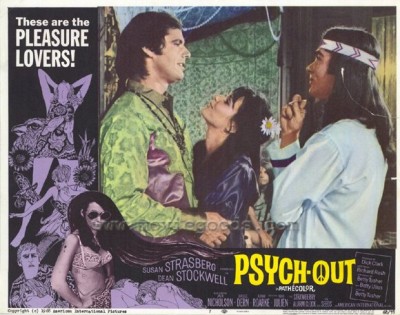| Reviews & Columns |
|
Reviews DVD TV on DVD Blu-ray 4K UHD International DVDs In Theaters Reviews by Studio Video Games Features Collector Series DVDs Easter Egg Database Interviews DVD Talk Radio Feature Articles Columns Anime Talk DVD Savant Horror DVDs The M.O.D. Squad Art House HD Talk Silent DVD
|
DVD Talk Forum |
|
|
| Resources |
|
DVD Price Search Customer Service #'s RCE Info Links |
|
Columns
|
|
|
Psych-Out (director's cut)
Originally released at 82 minutes, the Blu-ray restores director Rush's original 101-minute cut, which helps flesh out the characters, and the high-def transfer is stellar throughout.
Jenny (Susan Strasberg) is a deaf - but not mute - runaway searching Haight-Ashbury for her brother, Steve. Her only clue to his whereabouts is a cryptic postcard from him reading, "Jess Saes: God is alive and well and living in a sugar cube."
At a hippie coffee shop she meets Stoney (Jack Nicholson) and his two band mates, Ben (Adam Roarke) and Elwood (Max Julien). Womanizer Stoney is sincerely attracted to Jenny, and though she accepts his offer to crash at his pad (a house he shares with about a dozen others) she's hesitant about embarking upon a sexual relationship.
The movie mostly follows this foursome in their search for Steve, known locally as "the Seeker," with clues leading them to an automobile graveyard where they rumble with intolerant thugs also looking for the wayward sibling.
There are various subplots and side roads in the narrative that are variously good, bad, and completely ridiculous. The most memorable of these begins with the memorable cry, "Warren's freaking out at the gallery!" An artist friend of Stoney's, Warren (future director Henry Jaglom, with absurdly unreal muttonchops), is on a bad STP trip, hallucinating that his friends are the walking dead, and that his own arm has turned into rotting, diseased flesh, which he tries to cut off with a circular saw.
Stoney, meanwhile, is less interested in tripping, particularly when a promoter offers Stoney's band a chance to perform at "the Ballroom" (apparently the Avalon Ballroom). Ex-band member Dave (Dean Stockwell), living in a room on the roof of an abandoned warehouse, admonishes Stoney for selling out. Nevertheless, Stoney and Jenny become lovers shortly before Steve/Seeker (Bruce Dern) unexpectedly turns up.
Psych-Out apparently began as one of several screenplays Jack Nicholson developed during this period, and which may originally have been earmarked for Roger Corman. When Richard Rush became involved, reportedly the script was substantially rewritten (by Betty Ulius, a minor TV scribe), but Nicholson stayed aboard as the film's leading man. One "E. Hunter Willett" is credited with co-story and co-screenplay, but as "he" has no other credits at all on the IMDb it's likely Willett and Nicholson are one and the same.
The project seems to have come together from the most unlikely of alliances: struggling actor Nicholson, anarchic director Rush, and "America's oldest teenager," producer Dick Clark, whose multimedia empire was just getting started. Clark's interests, clearly, are purely commercial: he wanted to capitalize on all the press Haight-Ashbury and the Summer of Love was getting, while promoting a few bands prominently featured in the film, notably the Strawberry Alarm Clock (who sing their psychedelic signature tune, "Incense and Peppermints") and The Seeds.
Conversely, Nicholson and Rush appear sincere in wanting to capture the hippie movement at ground zero. Rush tries hard, as Roger Corman had done before with The Trip, to visualize the LSD experience, but the results are mostly laughable, as when Elwood imagines himself to be a sword-brandishing knight warding off the thugs in the junkyard. Some of Rush's symbolism is heavy-handed but grudgingly effective: outside a church, a straight-laced middle-aged couple criticize the way Stoney and his pals dress, at which point Rush's camera pans over to a stained-glass window showing Jesus and a couple of disciples garbed nearly identically.
Jack Weinberg's never-trust-anyone-over-30 mantra applied to Haight-Ashbury residents resentful of the cast and crew during filming. Except for Max Julien, then around 23, the principal actors were all between 30 and 35. Nicholson may have realized this early on, as his and some of the other characters have been conceived as slightly older, more disillusioned dropouts aware of the movement's internal problems, though Strasberg's part was clearly written for someone much younger.
However, she's very good in the role, as are Nicholson and Julien. Stockwell (wearing an Indian headband and wig) and Dern (also wearing a wig and looking like Jared Leto) only look silly.
Video & Audio
Olive's HD master of Psych-Out, provided by MGM, looks great, sourced from what looks like an undamaged original camera negative. The color (original prints by Pathé) throughout is impressive. The DTS-HD Master Audio mono (with no other language options or subtitles) is likewise strong. None of the Extra Features created for MGM's earlier DVD release have been ported over, a shame.
Parting Thoughts
Definitely worth a look as a time capsule, however skewered, of its era, shot on location at the very center of things, Psych-Out is a deeply flawed but in many ways sincere effort that's worth the time and trouble. Recommended.
Stuart Galbraith IV is the Kyoto-based film historian and publisher-editor of World Cinema Paradise. His credits include film history books, DVD and Blu-ray audio commentaries and special features.
|
| Popular Reviews |
| Sponsored Links |
|
|
| Sponsored Links |
|
|
| Release List | Reviews | Shop | Newsletter | Forum | DVD Giveaways | Blu-Ray | Advertise |
|
Copyright 2024 DVDTalk.com All Rights Reserved. Legal Info, Privacy Policy, Terms of Use,
Manage Preferences,
Your Privacy Choices | |||||||
















